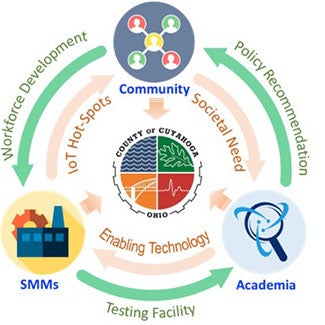Principle Investigator (PI): Robert X. Gao
Co-PIs: Kenneth Loparo, Kalle Lyytinen, Susan Helper and Pan Li
Professor Kalle Lyytinen, chair of design and innovation department at the Weatherhead School of Management and a faculty member of xLab, received a multi-year research grant from the National Science Foundation together with Professors Robert X. Gao, Kenneth Loparo, Susan Helper and Pan Li. This team is going to to create a smart and connected community in Northeast Ohio by forging a strategic alliance between the community and small-to-mid-sized-manufacturers (SMMs) that engage with industrial internet of things (IIoT) technologies.
Smart and connected technologies have the potential to dramatically reshape the manufacturing landscape, affecting not only the way products are manufactured, but also how the workforce is trained, providing new opportunities for employment, and improving the economic viability and sustainability of communities where manufacturing companies reside. The IIoT infrastructure and integration of technologies from artificial intelligence (AI) and machine learning is accelerating such changes, while capital investments to engage SMMs with IIoT and Industry 4.0 (I4.0) have remained a daunting task that impacts the economic viability of many communities.
This project represents a collaborative effort among academic researchers and educators in engineering, education and management at Case Western Reserve University, Cleveland State University and Lorain County Community College with community advocates and stakeholders, economic development partners and local SMMs. Collectively, research and development efforts will be directed to transforming participating SMMs into “smart” and connected enterprises with enhanced adaptivity, competitiveness and resilience to new supply chain dynamics. This approach will enhance the competitiveness of the local SMM and at the same time prepare a workforce to meet the challenges of the introduced technology. Such transformation will position the community for economic growth through a “smart and connected” local industrial base and upskilled workforce. The blueprint of this approach will also be transferable to other communities.
The collaborative action plan consists of:
1. Use-inspired innovative research;
2. Education, workforce training and development;
3. Policy recommendations on community behavior and organizational development.
Since effective transformation of manufacturing data to actionable information is key to successful implementation of I4.0 technologies, research on AI for real-time operation monitoring and asset tracking will be conducted to improve quality control and productivity. Through process-embedded sensing, and edge- and cloud-computing, a customized learning and intervention platform will be created to facilitate digital transformation of the workforce from experience-based operation to data-guided optimization. Research on transfer learning will facilitate knowledge translation across machine equipment both within an SMM and to other SMMs across the organizational boundaries to create “spill-over” learning effects that promote the creation of a collaborative SMM network that assists each other in times of need and opportunity. Collaborations between academia and community developers will create pathways for curriculum development and internships that facilitate workforce training and employment opportunities. Ultimately, the collective action plan will promote research on both fundamental and practical problems, and benefit education, workforce development, and economic advancement in both Northeast Ohio and other regions across the country where SMMs play a critical role in the wealth generation and wellbeing of the community.


